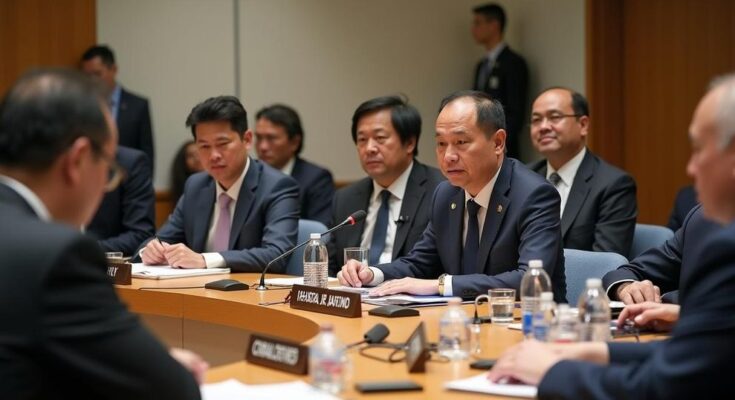Thailand’s recent election to the UN Human Rights Council contrasts sharply with its treatment of refugees like Y Quynh Bdap, who faces extradition to Vietnam under dubious charges. Despite being recognized as a refugee by the UNHCR, his legal struggles reveal a troubling pattern of human rights violations that challenge Thailand’s credibility on the international stage.
As Thailand ascends to a seat on the United Nations Human Rights Council for 2025-2027, a chilling shadow looms over the nation’s commitment to human rights. Amidst celebrations, Y Quynh Bdap, an ethnic Ede and founder of Montagnards Stand for Justice, remains confined in Bangkok Remand Prison, embroiled in a harrowing legal battle against extradition to Vietnam. There, he faces a possible decade-long prison sentence on terrorism charges—a claim he vehemently denies. His recent plight began with a controversial court ruling on September 30, where a judge, influenced by Vietnamese officials present at the trial, approved a request for Bdap’s extradition. The Montagnards, primarily Christian minorities from Vietnam’s Central Highlands, have a treacherous history with their homeland’s authorities, exacerbated by their ties with the U.S. military during the Vietnam War. Bdap’s conflict with the state traces back to 2012 when he was detained without legal access and coerced into renouncing his faith. After years of persecution, he fled to Thailand with his family in search of asylum, only to find himself vulnerable to repatriation. Even with the U.N. High Commissioner for Refugees (UNHCR) recognizing his status as a refugee, Thailand has yet to ratify the 1951 Refugee Convention that guarantees essential protections for individuals like him. In January 2024, following pressure from Hanoi, the Thai authorities arrested Bdap on an overstayed visa charge, while simultaneously considering Vietnam’s allegations of his involvement in a deadly attack on government offices—an event he disclaims any connection to. His lawyer, Nadthasiri Bergman, adamantly explains, “Our argument in the extradition case is that he cannot be extradited because he is a recognized refugee and he was undergoing the resettlement process.” She emphasizes the UNHCR’s involvement just before his capture, which found no evidence linking him to terrorism. The irony of Thailand securing a role on the U.N. Human Rights Council amid such foxholes of injustice has not escaped human rights activists. They accuse Thailand of a patterned betrayal of its commitments, evidenced by past actions like the extradition of dissidents to authoritarian regimes under the guise of law enforcement. Prakaidao Phruksakasemsuk from the Cross Cultural Foundation highlights a disturbing trend where activists have mysteriously vanished or faced dire fates under watchful Thai authorities—cases entwined in a troubling “swap mart” of political allegiance and human rights abuses. Experts, like Phil Robertson, note that for Thailand to fulfill its new international obligations, it must adopt a resolute stance on human rights issues: “If Thailand wants to sit as a member of the U.N. Human Rights Council in Geneva, it needs to consistently stand up for human rights principles.” While hopes linger for change following the election of new leadership, the fate of Y Quynh Bdap will loom large. Rights groups remain steadfast, advocating against his probable extradition, recalling the dark chapter of 2015 when Thailand returned Uyghurs to an uncertain fate in China despite assurances of humane treatment—a decision that still haunts many. As Thailand moves forward on the international stage, grappling with its own contradictions, the stark reality of Bdap’s situation will serve as a litmus test for the nation’s integrity in human rights advocacy, leaving the world to watch and wait.
Thailand’s recent admission to the UN Human Rights Council marks a pivotal moment in its engagement with international human rights dialogues. However, this achievement is cast in stark contrast to ongoing human rights violations within the country. The case of Y Quynh Bdap illustrates a significant contradiction: while Thailand seeks a prominent role in global human rights discussions, it simultaneously faces backlash for its treatment of asylum seekers and refugees, particularly those fleeing authoritarian regimes such as Vietnam. The plight of Bdap and similar cases expose the complexities of Thailand’s political landscape and its commitments to human rights.
Thailand’s election to the UN Human Rights Council symbolizes a potential shift towards honoring human rights obligations; however, cases like Y Quynh Bdap’s underscore the significant challenges that remain. Activists and legal advocates call for the Thai government to align its actions with its newly adopted international commitments, emphasizing the urgent need for concrete safeguards for refugees and dissidents. The world watches as the unfolding narrative of human rights in Thailand continues, particularly in the face of Bdap’s imminent extradition decision, which may define the government’s true stance on human rights going forward.
Original Source: www.rfa.org



